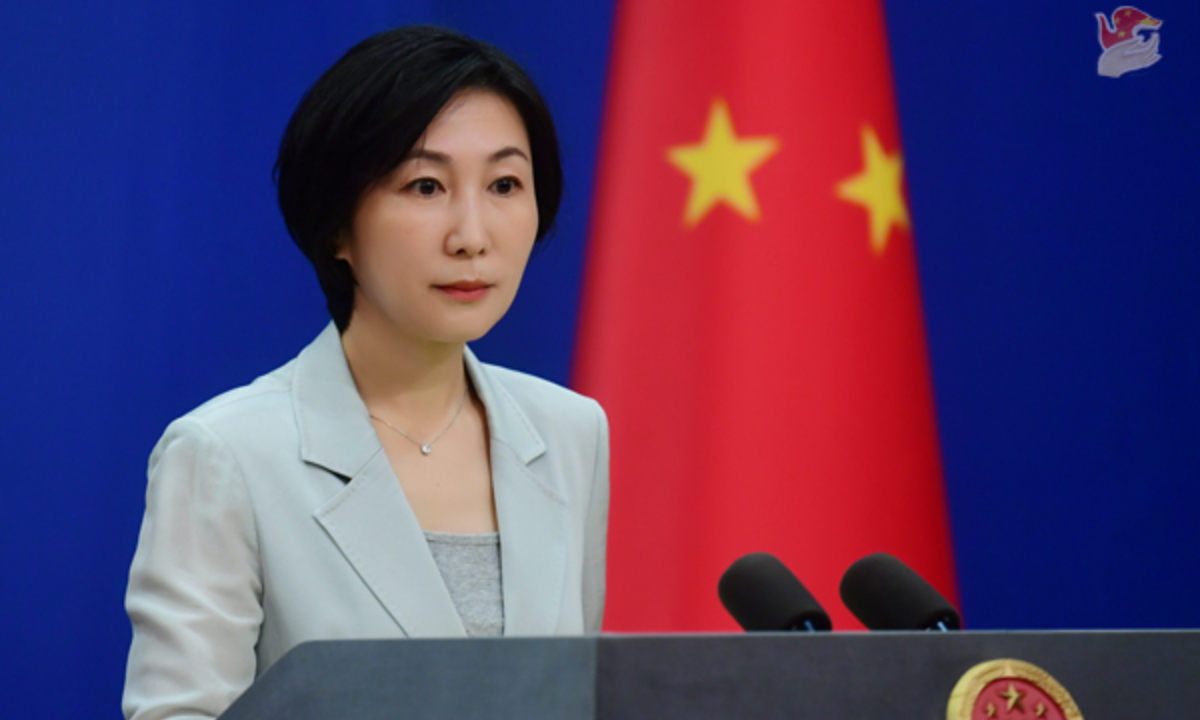
Foreign Ministry Spokesperson Mao Ning Photo: Ministry of Foreign Affairs
China has urged the US to stop politicizing the COVID issue and to focus on fighting the virus. While some countries like the US and Japan imposed new travel curbs on passengers from China, citing concerns over new variants and the resurgence of outbreaks, China said it always believes that countries should not use discriminatory practices to affect normal people-to-people exchanges.
"We have noted that recently some people in the US have made comments on China's COVID policy adjustment. We also noted that quite many people have said if the US had not politicized the epidemic, and had treated it responsibly and put people's lives first like the Chinese government, perhaps the COVID situation in the US and the whole world would not have become what it is today," Mao Ning, spokesperson of the Chinese Foreign Ministry, said at a press conference on Wednesday, when asked about the latest comment from US officials criticizing China for lacking transparency in COVID information.
"We truly hope the focus will be on tackling the virus rather than politicizing the COVID issue, and countries can step up solidarity and make joint efforts to defeat the pandemic," Mao said.
The comments were made after the White House called Beijing's recent reaction toward the travel curbs imposed by some countries, including the US, as "retaliation."
In response to some countries imposing fresh regulations on travelers from China, the Chinese Foreign Ministry said on Tuesday that China will take corresponding measures in response to varying situations based on the principle of reciprocity.
China has always shared its information and data responsibly with the international community, Mao said. According to incomplete statistics, over the past three years, China has carried out over 60 technical exchanges with the WHO, two of which were conducted after the release of the 10 new measures alone.
China continues to share the genome data of the virus via the Global Initiative on Sharing Avian Influenza Data (GISAID). Health experts from many countries have said that entry restrictions targeting China are unnecessary, the spokesperson said.
The US has always used the epidemic to achieve its political goals by launching a smear campaign targeting China, and slandering China's domestic and global efforts in fighting the epidemic, which also echoes its China strategy characterized with competition and rivalry, Li Haidong, a professor at the Institute of International Relations at the China Foreign Affairs University, told the Global Times on Wednesday.
When it comes to countermeasures against the US' discriminatory and unnecessary moves toward travelers from China, Li said China could adopt measures on the basis of reciprocity, for example, imposing mandatory PCR tests on those traveling from the US to China.
"But it's the US side that created a bad precedent, putting more obstacles in the way of normal business and people-to-people exchanges between the two countries," he said.
Besides the US, Japan also stepped up border controls targeting travelers from China, as the Asian country will require more stringent test results from Chinese visitors, according to media reports.
The current measures require all travelers from the Chinese mainland to take simple antigen tests upon arrival in Japan. Those who test positive are required to stay at quarantine facilities, NHK reported on Wednesday.
Under the new plan, arrivals from the Chinese mainland will be required to undergo more accurate quantitative antigen or PCR tests. Travelers on direct flights from the Chinese mainland will also need to show a negative test result, the media report said.
In response to Japan's new measures, Mao, the spokesperson, said China always believes that for all countries, COVID response measures need to be science-based and proportionate.
"They should not be used for political manipulation, there should not be discriminatory measures against certain countries, and measures should not affect normal travel and people-to-people exchanges and cooperation," she said.
The European Union Health Security Committee said on Tuesday that EU member states agreed on a "coordinated approach" to the changing COVID-19 situation, and most EU countries are in favor of introducing pre-departure COVID testing for travelers from China, according to media reports.
Some countries, however, have been holding back on those new restrictions - for example, Austria said that any restrictions on arrivals from China would be a massive blow, as it said China's reopening "heralds the return of the most important Asian source market for the coming tourism seasons," Politico reported on Tuesday.
Some foreign scientists do not support the new travel curbs on travelers from China, as some say that it's unnecessary and won't stop the virus' spread, given that the variants have been moving around the globe.
"Travel restrictions can partially inhibit the importation and spread of the virus. However, in today's globalized economy, a closed country is not possible," Kaio Kitazato, a virologist from the Department of Biomedical Sciences at Nagasaki University, told the Global Times.
As long as there is movement of people, it is impossible to completely avoid virus importation if travel restrictions are imposed only on specific countries, Kitazato said.
James Wood, a professor at the School of Population Health of the University of New South Wales, echoed this view, saying that he is not convinced that the travel curbs will have any significant effect on the spread of cases from China to other countries.
Jeffrey Shaman, an epidemiologist at Columbia University, told the Global Times through an e-mail that he does not believe that the travel curbs will help stop "the danger" claimed by some countries.
"Because the virus is already everywhere and as other variants have shown, they move around," he said.




